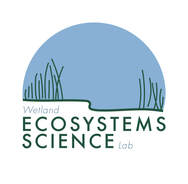RESEARCH
Integrating wetland ecosystem services into resource and land-use decision-making is becoming increasingly commonplace as a means to promote ecosystems' health through political and community stewardship in conservation, and to build socio-ecological resilience to land-use and climate change. However, how to maximize ecosystem services through ecosystem management is still not clear due to a gap in our understanding of underpinning ecological processes that set regulating and supporting functions, and the relevant scales that these processes can be modeled and handled in practice.
Our research focuses on understanding how the interplay between plants, soils, and water affects ecosystem functioning in wetland ecosystems and riparian zones. Specifically, we aim to understand the effects of heterogeneity in plant communities, physical structure, and hydrology in greenhouse gas fluxes and C sequestration. We also study what the most suitable scales (time and space) to represent the functional heterogeneity of these processes are. Answering these questions is relevant to improve the ability to represent C cycling in process-based models and parametrize these ecosystem functions at a whole-wetland ecosystem-scale, which is mainly the scale used by practitioners, resource managers, and climate modelers. Our research is also relevant for practitioners and scientists conducting measurements in the field.
To answer these research questions, we use a diverse suite of measurements and observation techniques at different spatiotemporal scales, including hydro-meteorological monitoring; soil coring and dating; water, soil, and plant C analyses; non-steady-state chambers to measure C fluxes, in-situ pore-water dialysis samplers, and plant surveying.
Our research focuses on understanding how the interplay between plants, soils, and water affects ecosystem functioning in wetland ecosystems and riparian zones. Specifically, we aim to understand the effects of heterogeneity in plant communities, physical structure, and hydrology in greenhouse gas fluxes and C sequestration. We also study what the most suitable scales (time and space) to represent the functional heterogeneity of these processes are. Answering these questions is relevant to improve the ability to represent C cycling in process-based models and parametrize these ecosystem functions at a whole-wetland ecosystem-scale, which is mainly the scale used by practitioners, resource managers, and climate modelers. Our research is also relevant for practitioners and scientists conducting measurements in the field.
To answer these research questions, we use a diverse suite of measurements and observation techniques at different spatiotemporal scales, including hydro-meteorological monitoring; soil coring and dating; water, soil, and plant C analyses; non-steady-state chambers to measure C fluxes, in-situ pore-water dialysis samplers, and plant surveying.
|
SCHOOL OF GEOSCIENCES
University of Louisiana at Lafayette 219 Hamilton Hall 611 McKinley St. Lafayette, LA. 70504 |
Follow us:
|
|

